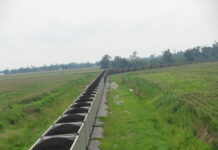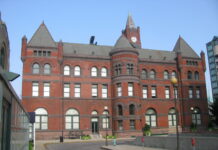Photo credit: DiasporaEngager (www.DiasporaEngager.com).
Israeli jets struck a weapons depot belonging to the Hezbollah terror group “in the heart of a civilian area” of Lebanon, the army said on Wednesday, alongside a video of the strike.
The Israel Defense Forces (IDF) said the aerial bombing targeted the Iran-backed group’s arms production infrastructure in a village in the Baalbek region in south Lebanon. Footage showed large explosions that Israeli officials described as proof that Hezbollah was storing munitions in residential areas.
“Hezbollah places its production infrastructure in the heart of civilian populations in southern Lebanon, in the Beqaa Valley and in Beirut, and uses the Lebanese people as human shields,” the IDF said in a statement. “The large and lengthy secondary explosions seen in the video are further proof of Hezbollah’s modus operandi, in which it stores explosives and dangerous chemical substances in civilian villages.”
The strike comes amid escalating tensions between Israel and Hezbollah. The IDF said last week that it had targeted more than 4,500 Hezbollah targets since the outbreak of the war against Hamas in Gaza on Oct. 7, including weapons shipments and production facilities used to manufacture rockets and other munitions. Hezbollah has identified more than 240 of its members killed by Israel since Oct. 8, but the IDF puts that number at over 300, including senior operatives. Israeli strikes have also targeted Hezbollah operatives in Syria as well as members of other terror groups, including Iran’s Islamic Revolutionary Guard Corps (IRGC).
Sarit Zehavi — a resident of northern Israel and the founder and director of Alma, a research center that focuses on security challenges relating to Israel’s northern border — said that the strikes are part of a broader plan to cement a significant military victory in Lebanon that would destroy the terror group’s capabilities but at the same time avoid an all-out war. The “third path” policy, which would include a diplomatic element, Zehavi noted, was not reflective of the Israeli public’s view. A poll released earlier this week found that 60 percent of Israelis supported a war against Hezbollah, but Zehavi cautioned against not putting the numbers in their context.
“Israelis are not interested in war; war is not our priority. You see this number because people don’t believe that you can bring back the 60,000 people who were evacuated from their homes safely without war. What we saw happening on Oct. 7 in the south was supposed to happen in the north. Hezbollah had the same plan exactly,” Zehavi told The Algemeiner.
“Israelis today are no longer willing to sleep next to the monster that is Hezbollah that is willing to execute people and take hostages as human shields.”
More than 60,000 Israelis from Israel’s northern region near the Lebanon border have been evacuated from their homes amid daily anti-tank, missile, and mortar fire and are living in hotels and other forms of temporary housing. A further 70,000 are still evacuated from Israel’s southern region near the Gaza border, where Hamas carried out its massacre of 1,200 people on Oct. 7.
According to Zehavi, “three clocks are ticking” in parallel regarding a timeline for returning the displaced people to their homes. The first is the Israeli government, which is feeling the strain of rehousing tens of thousands of people and is also keen to return people to their homes before the start of the school year in September. The second is the Biden administration’s opposition to another war ahead of November’s elections in the United States. The third is Iran, which is hoping to gain the upper hand over Israel.
But Zehavi said that the lack of deadline coupled with an unclear notion of how a diplomatic agreement would be implemented — including which entity would enforce it — made the prospect of returning home fraught. “The diplomatic agreement being discussed is not enough to make us feel secure … it’s clear that Hezbollah would not fulfill an agreement, as it didn’t the last time, in 2006.”
United Nations Security Council Resolution 1701, adopted in 2006 during the Second Lebanon War, called for the disarmament of Hezbollah and the deployment of Lebanese and UN peacekeeping forces, UNIFIL, in southern Lebanon. Currently, however, Hezbollah wields significant political and military clout in Lebanon, with according to some estimates about 150,000 rockets pointed at Israel.
“[Hezbollah chief Hassan] Nasrallah is not interested in a ceasefire as long as Israel is at war with Gaza. He has said that very clearly again and again. Which means that we continue to live under threat here and we cannot bring people back home,” Zehavi said.
On Tuesday, two IDF soldiers were wounded when a rocket fired by Hezbollah hit an army post near the Menara kibbutz close to the northern border. More than 90 percent of the homes in Menara have been damaged by Hezbollah fire.
The news of the strike came after the IDF announced the formation of the new “Mountains” brigade on the border with Syria and Lebanon that it said would “specialize in combat in challenging terrain and warfare in mountainous areas.”
Zehavi also addressed news that a Lebanese man, Basel Bassel Ebbadi, had been arrested by US Border Patrol while attempting to illegally cross into Texas. Ebbadi confessed to being a member of the Hezbollah terror group with the plan of “making a bomb.”
“It’s not surprising. I believe there are more like him,” she said. “There will be more attempts on American soil.”
Source of original article: Israel – Algemeiner.com (www.algemeiner.com).
The content of this article does not necessarily reflect the views or opinion of Global Diaspora News (www.GlobalDiasporaNews.com).
To submit your press release: (https://www.GlobalDiasporaNews.com/pr).
To advertise on Global Diaspora News: (www.GlobalDiasporaNews.com/ads).
Sign up to Global Diaspora News newsletter (https://www.GlobalDiasporaNews.com/newsletter/) to start receiving updates and opportunities directly in your email inbox for free.































